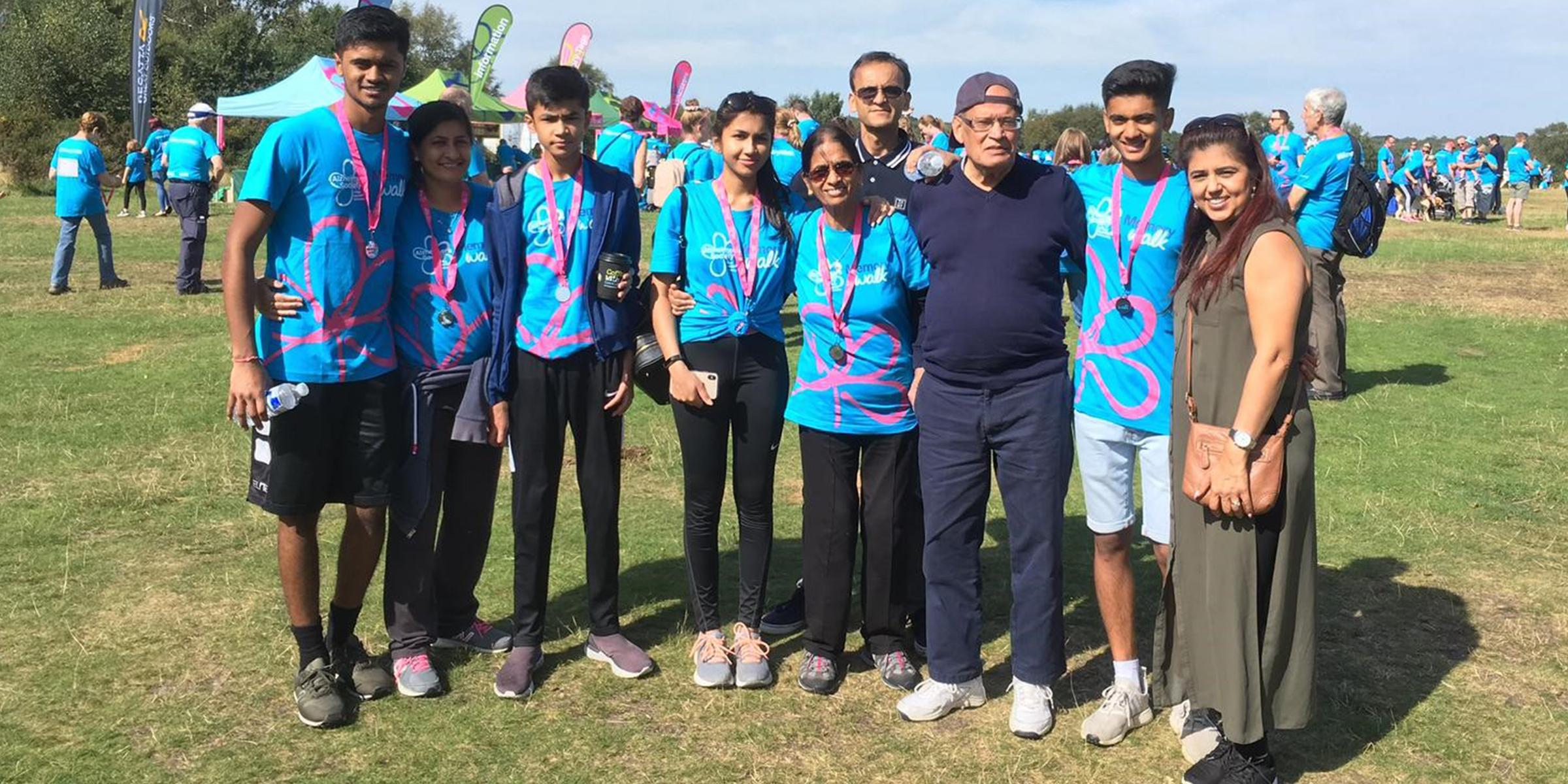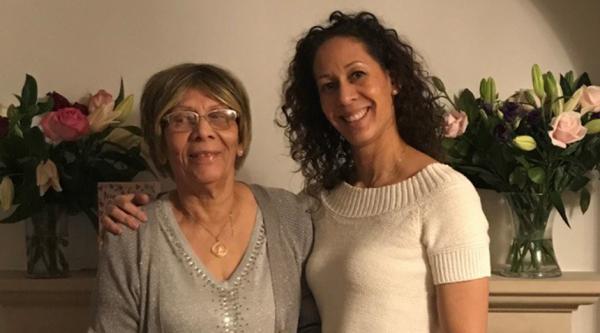
Better talking: The importance of accepting help when you’re caring for someone with dementia
Mithlesh Mittal has found it increasingly challenging to support her husband as his dementia progresses.
Since her husband Shashi was diagnosed with dementia in 2015, life has become increasingly tough for Mithlesh Mittal.
‘It’s been very difficult in recent years,’ she says. ‘He now forgets everything and doesn’t recognise anybody. Looking after him is a big challenge which I cannot take myself alone.’
Mithlesh has called upon all the help she can get, including family members, professional carers and Alzheimer’s Society. And despite the additional impact of the pandemic, she remains determined to continue supporting 81-year old Shashi.
‘I’m not young and it’s very tiring, but it’s my duty to carry on for as long as I can,’ she says.
Chess champion
Mithlesh and Shashi both grew up in India and married there in 1964. The following year Shashi, a maths and science teacher, decided to move to England.
‘The family went crazy,’ recalls Mithlesh, who was a social worker at the time. ‘My Dad got mad and said, “You’ve just married my daughter!”’
Shashi got a job in the West Midlands as a trainee cost accountant, and over the years worked as a cost clerk and for a housing association. In his retirement he was an interpreter for the police, schools and hospitals. He was also a chess champion who taught other family members how to play.
Mithlesh joined Shashi in Wolverhampton in 1966, later working as a primary school teacher. The couple have three children and seven grandchildren.

Shashi and Mithlesh.
Worst time
It was in November 2014, during their 50th wedding anniversary celebrations at a Hindu temple, that Mithlesh first noticed changes in Shashi’s behaviour.
‘He wasn’t greeting guests or celebrating, he was just looking at people like he didn’t know them,’ she says. ‘It was out of character. I felt he was lost in some way.’
Shashi struggled to follow the instructions of the priest and afterwards forgot that he had already paid him.
Such memory problems continued at home, which Mithlesh found very challenging.
‘He was helping me in the kitchen and garden but was asking the same things over and over,’ she says. ‘Anything that was going wrong in the house, he was blaming me – he accused me of touching his laptop while he was out. But he also wasn’t believing that anything was wrong with him.
‘That was the worst time of my life. I couldn’t take any more, so I went to the doctor.’
The GP gave Shashi some tests before referring him to a mental health clinic, where a psychiatrist diagnosed him with mixed dementia in June 2015.
‘Can I cope?’
Mithlesh did her best to support Shashi over the next year but was finding things very difficult. Having read about a local dementia café in the newspaper, she went along with Shashi in August 2016.
‘I was feeling awkward and thinking, “Can I cope here?”’ she says. ‘But I met Jane Round from Alzheimer’s Society, who was so helpful, welcoming and friendly. After that, my life started to get better.’
Mithlesh later attended sessions tailored for South Asian communities, where she met Anuja Jalota, a Dementia Support Worker.
‘She used to visit us at home if I needed to discuss help from social services. After lockdown she has been ringing to find out about Shashi’s health.
‘The cafés were brilliant – they were a saviour and gave us a new lease of life,’ says Mithlesh, who also got involved with a music project and later set up a dementia café with some of the people she met there, called Cogs.
‘Anywhere I can take him, I’ll take him,’ she says.
Come running
Shashi did morning yoga every day for 15 years and was a good swimmer, but by 2016 was unable to do either. The following year, he stopped attending the organised park walks that Mithlesh had been taking him to.
‘I tried my best to help him continue with his interests as far as he could, but by 2018 everything had stopped,’ she says.
Shashi, who also has diabetes, is now supported by professional carers day and night.
‘They’re helpful and it gives me respite to go shopping or to the park, otherwise I’d go mad,’ says Mithlesh.
Shashi enjoys drawing, so Mithlesh tries to encourage him with pencil and paper, and she also plays the harmonium and sings to him.
‘He loves listening to the music,’ she says. ‘It makes him more responsive, he’s not as blank.

Mithlesh and Shashi receive excellent family support.
Putting her husband’s needs first means that Mithlesh has less time than ever for herself.
‘Every day is a new day, as my daily routine depends on his mood,’ she says. ‘You can’t plan anything with friends, so in that sense life is gone.’
Mithlesh and Shashi receive excellent support from their children and grandchildren, who visit regularly (outside of lockdown) as well as making phone and video calls.
‘I know if I need any help, they will come running,’ says Mithlesh. ‘I’m very lucky in that sense.’
The family has also done some fantastic fundraising for the Society. Mithlesh’s daughter has taken part in three Memory Walks in London, while a grandson arranged for the whole family, including Shashi, to do the Sutton Coldfield Memory Walk in 2019, raising £655.
Slowed down
The suspension of face-to-face services because of the pandemic has made life worse for both Mithlesh and Shashi.
‘I think he would have done better if he was still meeting people and laughing and playing games, but you can’t do all that at home, so he’s slowed down,’ says Mithlesh, who along with Shashi received her first dose of the COVID vaccine in January.
‘He also doesn’t like to be ignored, so if I’m on the phone he’ll get angry and shout, “Put it away,” and hit the phone.’
More comfortable
Although people’s understanding of dementia has improved generally, Mithlesh feels that better awareness among South Asian communities would help people to get the right support.
‘I think people in the temples and holy places should do more. After lockdown they could have small gatherings. I could go and help,’ she says.
Mithlesh has become much more comfortable discussing Shashi’s dementia with people outside the family.
‘In 2014 I was so scared to tell people that anything was wrong, in case they might think he was mad,’ she says. ‘But I don’t hide anything now. In fact, it makes me feel better talking about it.’
What can you do to help?
You can help ensure that more carers like Mithlesh receive the support that they need.



Anjali Malik
saysUs grandchildren are so lucky to have a strong independent woman to look up to :) Love you Nanima xx
Mamta
saysMithlesh, (my mum) is an amazing woman who not only looks after dad but is always there for her children. We are so proud of her!
Love you xx
Bhushan Malik
saysWell done Mum for being such a strong woman. We all love, respect and will support you in any way possible. You will never be alone to face challenges that lie ahead. I may be your son-in-law, but you are my mother.